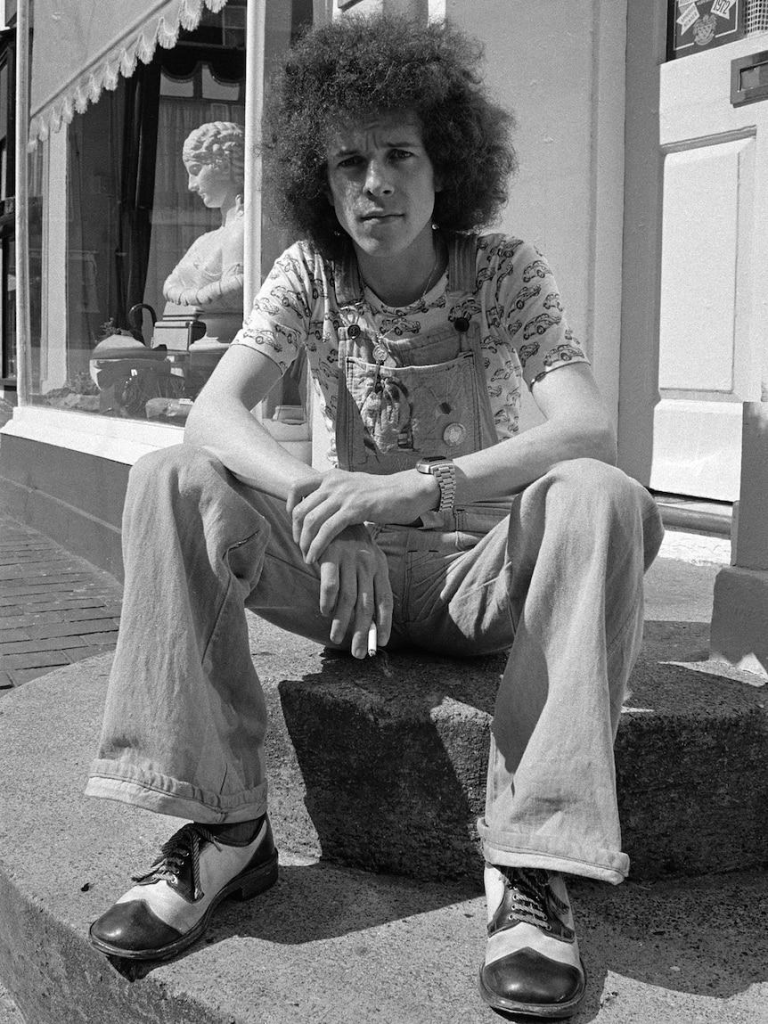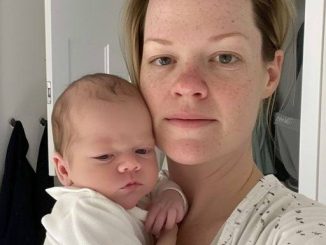“I look at my role as being a friend of Canberra Hospital, I can bring some pleasure and happiness sometimes to people who are really in difficult times in their lives.”
With backing music from a Bluetooth speaker, Sayer croons his way around the cancer wards, making a human connection with everyone he comes across.

Canberra Region Cancer Centre Operations Manager Caroline McIntyre says Sayer’s visits are typically kept a surprise for patients and staff.
“He’s always come in so discreetly,” she says.
“Normally it’s just very quiet, he comes up in the back lift and says hello to literally everybody.
“Some of them are doing it tough, and to have a little bit of joy and light – it really gives them a lift.
“What makes me happy is to see people getting chemo on their feet dancing.”
Jamming with Jimi Hendrix, Countdown and the Troubadour
Originally a graphic designer by trade, English-born Leo Sayer rose to pop prominence in London in the late 1960s, as a singer-songwriter – and was soon adopted by Australia as an honorary son after his first tour here in 1974.
He went on to become an Australian citizen in 2009.
Sayer was a regular on ABC TV’s Countdown during the 70s and 80s, performing chart-toppers like “You Make Me Feel Like Dancing”, “When I Need You”, “More Than I Could Say” and “Orchard Road”.

He blushingly admits they were wild days – when he didn’t always live up to his “good-guy” public persona.
“It was mad, I mean, Top of the Pops in England, Countdown over here,” he says.
“You were mobbed by the fans, I remember being dragged out of a limousine the first tour that I came here, and then speaking to crazy people like Molly Meldrum on TV and trying to sort of like take it all in.”
It seems hard to believe – the petite, well-spoken singer, with a mane of curly hair that inspired changing his name from Gerard to Leo – beating off mobs of screaming fangirls.
Sayer circulated in superstar company, becoming close friends with former Beatles George Harrison and Paul McCartney, collaborating with Roger Daltrey of The Who, and even sharing a sly cigarette or two with John Lennon and Yoko Ono who had a flat above his design studio.
“I met Jimi Hendrix right at the start of his career. I actually jammed with him, playing the harmonica, and him playing the guitar,” he says.
Recalling his 1975 opening night at the famous Troubadour Club in Los Angeles, he looked up to see an intimidating line-up of fans in the front row.

“It was David Bowie, Elton John, and ‘The Fonz’ [Henry Winkler].”
Alongside them: John Cleese, Mick Jagger, Bernie Taupin, and comedian Marty Feldman.
“We never thought it would last, we were adapting to things around us, writing songs about things that are around us,” he says.
“And we thought they were only for our generation — so the amazing thing is my music’s become like a fine wine, where you lay it down and years later, it becomes a collector’s item.
“We’re in an age where the music that I make, young kids are actually latching onto it now, and they’re finding that that generation and that style of music we made is as current now as anything.”
Sayer’s health battles, still spreading hope at 76
Leo Sayer says his hospital charity work caps off a career dedicated to providing joy through music.
“It’s a nice piece of synchronicity really, because I was born in the grounds of a hospital in Shoreham by Sea in Sussex, near Brighton in England,” Mr Sayer said.
“I suppose I’ve always felt comfortable in hospitals and being around hospitals.
“Growing up, my dad was a hospital engineer, Mum was a nurse, my sister was a matron.”

Sayer has health struggles of his own, including three stents in his heart, which help him have a genuine connection to the hospital patients he entertains.
“[My music] is providing something that isn’t taking away from any of the treatment that’s going on. It’s providing something that’s just putting a smile on peoples’ faces.
“Music is communication and that’s what this is all about, we’re communicating, we’re making people feel better.
“We’re not healing people with music, but we are making them feel better about their healing.
“To sell out Canberra Hospital will do me fine.”
When He Asked Her Inappropriate Question She Slammed The Door

There are many different ways to look at laughing at crude jokes, and a person’s values and the context usually determine whether laughing at such jokes is suitable or not.
Benefits of Laughing at Unsolicited Jokes:
1. Humor and Emotional Well-Being: Laughing at inappropriate or forbidden subjects such as s** can indicate emotional well-being. It enables people to confront and navigate societal taboos in a less threatening and more approachable manner. Humor can serve as a coping strategy and a means of fostering human connections via common experiences (Daily Writing Tips) (NCRegister)
2. Relief and Connection: By introducing surprise and incongruity—two essential components of humor—dirty jokes can also offer relief. This surprising turn of events can humanize difficult or uncomfortable themes and foster a sense of community among people who laugh together (NCRegister).
Maintaining Humor Balance:
Ultimately, the context and the joke’s character determine whether laughing at dirty jokes is appropriate or not. It is crucial to take into account the humor’s intended meaning and the effect it has on other people. Jokes can be a constructive way to communicate humor if they highlight human experiences without denigrating others. It’s best to avoid the humor, though, if it veers into inappropriate territory or unnerves people.

In conclusion, even while telling dirty jokes can be a method to bond and decompress, it’s important to handle them delicately and be mindful of the potential effects they may have on certain audiences.
Now for the joke!
Are you in possession of a
Have you got a v*****?A woman at home alone is asked by a man who just stood there and knocked on the door.
That evening, she tells her husband with a mocking bang of the door as he returns from work. The next morning, she answers a knock on the door. It is the same man who asks the question.
Have you got a v****a?
Once more, she slams the door.
She picks up the phone and immediately calls her spouse at work. Should the man happen to turn up a third time, which is quite unlikely, he tells her he will take tomorrow off.
The next morning, they both answer the door when they hear a knock.
The spouse whispers to her, “Honey, I’m going to hide behind the door and listen.”
If he is the same guy, please respond positively to his question so I can see where he’s headed.
She nods to her husband, indicating her acceptance, and opens the door. Yes, that is the same guy standing there.”Do you possess a v****a?” he asks.
“Yeah, I do,” the lady answers.
“All right, could you please tell your husband to use yours and leave my wife’s alone?”The man answers.



Leave a Reply